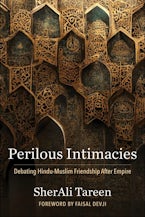- Home
- Contending Modernities
- religion
- history
- Pastoral Power, Clerical State

Pastoral Power, Clerical State
Pentecostalism, Gender, and Sexuality in Nigeria
By: Ebenezer Obadare
Series: Contending Modernities
222 Pages
- Paperback
- ISBN: 9780268203146
- Published By: University of Notre Dame Press
- Published: September 2022
$35.00
Pentecostalism is undoubtedly one of the major religious forces and the fastest-growing Christian movement globally, and its centre of gravity is in Africa. Arguably, Nigeria is Africa's "Pentecostal capital city." Ebenezer Obadare's Pastoral Power, Clerical State Pentecostalism, Gender, and Sexuality in Nigeria deepens our understanding of the nature of Pentecostal power in Africa. The work uses empirical data to illustrate how the Pentecostal denomination in Nigeria has not only morphed to become a dominant social movement and paradigm but also to theorize Nigeria's otherwise unseen Pentecostal state. Obadare's core argument in this book is that Nigerian Pentecostalism cannot be understood without paying attention to the power of the Pentecostal pastor (the man of God).
Chapter 1 discusses the social origins of clerical power in Nigeria, describing and tracing the ascent of the academic (often referred to in the book as a man of letters) from the 1960s and climaxing in the 1980s. The author argues that it is hard to understand Nigerian Pentecostalism without focusing on the Pentecostal pastor. The Pentecostal pastor did not just emerge; they are a creation and a product of a context. The degradation of the Nigerian academic (the man of letters) created a vacuum in the public space that the Pentecostal pastor (the man of God) entirely took advantage of. Academics, once respected and influential, faded from relevance. They did not disappear entirely, but the book details why attention shifted from the man of letters to the man of God. Pentecostal traction in the person of the pastor convincingly offers a theory of the state and the crisis of the state to the Nigerian populace.
The sociology of this emergent context is what Obadare elaborates on in this chapter and further reveals the reasons precipitating the transition from the man of letters to the man of God and the evacuation of the academic from public space, which leads to the dominance of the Pentecostal pastor who takes advantage of military rule. The trauma inflicted by Nigeria's military on academic institutions was irrecoverable; it hollowed out the academy, undercutting its prestige and respect, leading to the current situation in Nigeria. In the public's estimation, the delegitimization of academics led professors to lose their social prestige as the military attacked academic institutions, the pillars of civil society. This attack on the academic paved the way for the Pentecostal pastor to exploit the situation. They proffered a simple explanation as to why poverty, unemployment, and state crises reigned in Nigeria. It is because of sin, and the professor is incapable of explaining or helping why the case is as it is; the only remedy is changing one's ways and turning to God as directed by the Pentecostal pastor.
Chapter 2 explores how Pentecostal pastors are entwined in politics and political processes that take advantage of a cultural context in which people's frame of reference is very spiritual. This frame of reference links the state and civil society; this ubiquitous supernaturalism is at the heart of people's beliefs. The Nigerian Pentecostal pastor in Obadare's analysis is aware of this fact and mobilizes it. The milieu that proffers spiritualism as a way of thinking about the world opens up the Pentecostal space. Thus, Pentecostalism becomes an avenue for political actors and a possibility of becoming socially ubiquitous.
Being a Pentecostal pastor in Nigeria is attractive because it is the apex of the prestige economy, and the pastor possesses an agency that instantiates in different spaces within society. Unlike other professions that require hard work and professional training, becoming a Pentecostal pastor in Nigeria is easy; one has to speak into being one.
Chapter 3 situates the Pentecostal pastor in the economy of pleasure, providing a nuanced understanding of gender and gender relations. The aspect of gender in this book brings out the complicated nature of women's agency in the Nigerian Pentecostal context. The last chapter refers to "four useless women"; against the pastor figure, these women are useless for not honouring the established norms of masculinity and slashing femininity. The women, though unsuccessful, stood up against the figure of the Pentecostal pastor. Obadare points out their failure is not because the pastor is untouchable but because of the complicated nature of women's agency. Other women would rise to rescue and defend the patriarchal stance against such natural challenges. The pastor often wins. The author illustrates that pastors that fail to win lack the social capital that others strategically use. The given social capital permeates social and political classes through connected networks offering legal immunity to the Pentecostal pastors. Innovative technology deployment and social media use are primarily for social capital mobilization. What makes the Nigerian Pentecostal pastor prime? The pastor's entrepreneurship, the pastoral's charisma, the pastor's training, and the capacity to use social media—all those things make the pastor prime.
The book advances the ongoing debate on the significance and role of Pentecostalism in Africa. It will appeal to those interested in Pentecostal discourses and how they offer metaphysical interpretations that explain why prevailing socioeconomic and political conditions regarding poverty and underdevelopment exist in Africa.
Elias Ng'etich is a PhD candidate at the University of Cape Town, South Africa.
Elias Ng'etichDate Of Review:May 31, 2023
Ebenezer Obadare is Douglas Dillon Senior Fellow for Africa Studies at the Council on Foreign Relations (CFR) and a fellow at the University of South Africa’s Research Institute for Theology and Religion. Before joining CFR, he was professor of sociology at the University of Kansas, Lawrence. He is the author of Pentecostal Republic: Religion and the Struggle for State Power in Nigeria.











